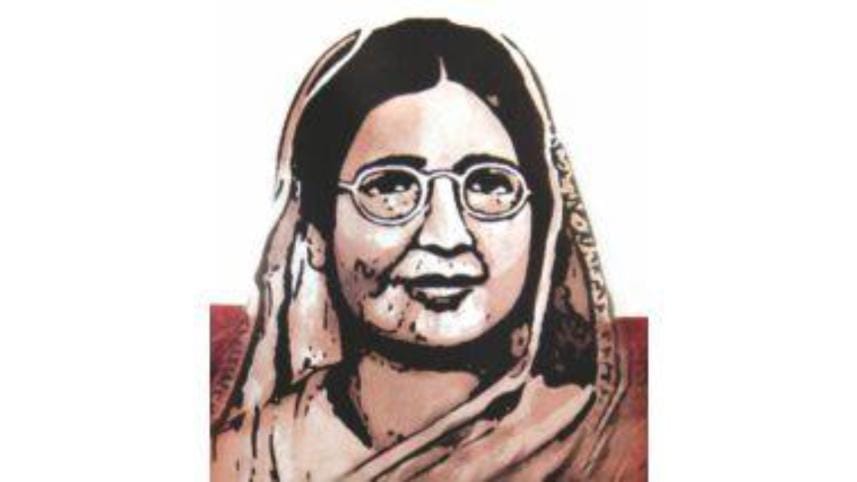Rokeya and the need for more sisterhood

In the last few weeks, about 40 Bangladeshi domestic workers in Saudi Arabia posted video messages on social media with SOS calls to be rescued. In those videos, the workers themselves described the abuses they faced in Saudi households and sought help to return back home. The outpouring of tears and the fears on the faces, clearly visible despite the veils they were wearing, say a lot about the brutality they had to endure in their overseas employment. They are the victims of patriarchy and globalised capitalism combined. Yet, we have allowed this to go on: in the last four years, 9,000 Bangladeshi women workers returned from Saudi Arabia, most of them with stories of physical torture and sexual assault, and another 152 bodies of women workers were received.
These migrant women workers are stripped of political and social citizenship. Their country of origin had done little to ensure safe working conditions for them, while the receiving country would not take any responsibility for improving their situations. The workers themselves have no political voice. Nobody stood with them in solidarity. Not in Saudi Arabia, nor in Bangladesh. There was also no display of "sisterhood" for them.
Begum Rokeya (1880-1932), writer and perhaps the most radical women activist in modern Bengal, is still fiercely relevant in naming and discussing such oppressions and exploitations of women. The first value that Rokeya promoted was the value of sisterhood: women need to stand alongside other women in solidarity. The reality of present day is quite different from hers in many ways, but the need for sisterhood is more than ever before.
In her views, the first step towards women's emancipation begins with education. It cultivates critical consciousness in the oppressed women in a patriarchal system.
Since Rokeya, the social conditions have undergone significant changes and major milestones have been achieved, especially in imparting basic education to girls. Women's long struggle have paved the way for many women taking up important roles in society. Two women leaders have been dominating our politics for the last two decades. More women than ever before are enrolled in schools, colleges and universities. Yet, the lives of working women have not improved meaningfully. Much remains to be done.
One of the major contributions of Rokeya was to identify that women remained an oppressed and exploited class for centuries. She also reminded us of the constant struggle women face, even to hold on to the rights, recognition and respect they achieve. More women's education and participation in job market have made the world a better place, but new forms of inequality and exploitation have emerged.
Undoubtedly, the economic progress that we have achieved in this country has come largely on the back of women workers. Though women make up 80 percent of the workforce in the readymade garment sector, they have a muted political voice. These factories often turn into sites of protests over living wages and allowances. Sexual harassment is an important source of mental stress for women workers. Incidence of sexual harassment ranges from insults directed at a person's gender, suggestive comments, or language, and demeaning remarks to unwelcome touching and grabbing and other physical assaults. These workers need support in terms of organising and forming alliance against harassment.
Sexual harassment and abuse in public places have become "normalised". Despite widespread incidents faced by women of all social classes, only a few generate some outrage. Unfortunately, we rarely see any solidarity across class, ethnicity and other categories of difference. There is no better time to look back at Rokeya's writings than this current moment.
Rokeya dreamt of a radical new future for women at the dawn of the 20th century. She was among the first women in Bengal to conclude that women's emancipation was impossible without economic freedom. For her, the key was educating women. Rokeya emerged as a writer at an era when women's education was seen as the path to producing suitable housewives. In a major departure from her contemporary activists or their predecessors, she emphasised women's economic independence as the essential component of women's emancipation and to rid them of mental slavery. Her vision still resonates strongly today.
Rokeya developed critiques of some of the roles that patriarchy had assigned for women in the name of tradition and religion. It is this critical consciousness that set her apart from other social activists.
Rokeya's imagination was not limited to women's economic freedom through education only, it went far beyond and dreamt of women wielding political power. Despite the presence of a number of women leaders in senior positions, we have serious lacking in this regard. Women workers have almost no representation; women labour-intensive sectors are among those that offer the least protection. The situation can only improve with greater distribution of political power.
It was beyond Rokeya's historical time to make or advocate spectacular advances for women's political power. But she certainly did dream of a day when it would be realised.
Zobaida Nasreen teaches anthropology at Dhaka University. Email: zobaidanasreen@du.ac.bd



 For all latest news, follow The Daily Star's Google News channel.
For all latest news, follow The Daily Star's Google News channel.
Comments